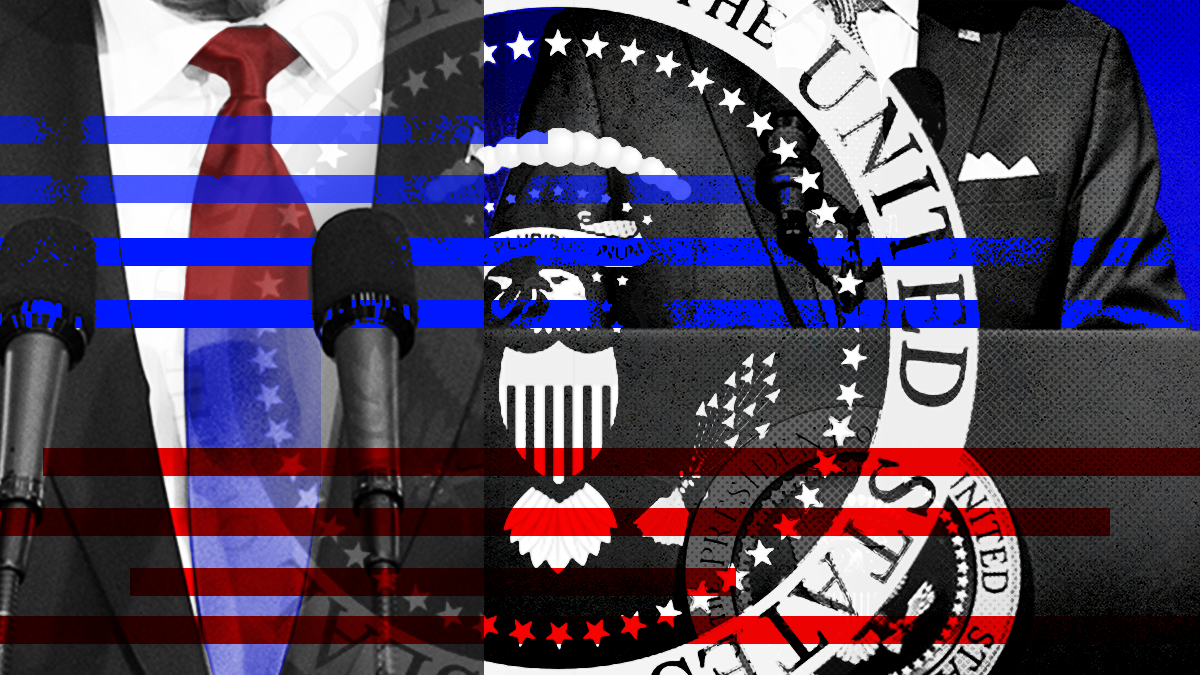Tonight’s face-off between Joe Biden and Donald Trump will be the first debate of its kind.
For one thing, bucking the tradition of recent years, there will be no live studio audience. For another, the mics will cut off automatically if candidates speak over time or out of turn.
But mostly, it’ll be the first time a sitting US president has debated his predecessor. That makes this a meeting of two largely known quantities. We already know both men as people and as presidents. The horizon of new things to learn about either of them is very, very limited.
Still, people will watch. Debates may be getting less useful – a new report by the NPR program Open to Debate charts the stark demise of the format over the past 20 years – but people do still watch them.
After the Super Bowl, debates remain one of America’s biggest TV draws. Whether people tune in as persuadable voters or as bloodthirsty spectators is a good question, but tune in they will. In our GZERO Twitter poll – which by the way is still open here – so far about 75% of respondents say they’ll be watching.
Will the debate matter? In a deeply polarized country choosing between two radically different candidates, most folks have their minds made up, it’s true.
But the margins matter. Biden won in 2020 by carrying a few swing states by fewer than 100,000 votes. For both men, pulling even a tiny percentage of persuadable voters back from the other guy, away from a third-party candidate, or off the couch to vote at all, could be the difference. And as a shameless plug for our Twitter poll here again, nearly 60% of you said it will matter. That’s a lot!
Policy vs. Perception. Abortion. Ukraine. Taxes. Gaza. Health Care. Immigration. We’ll hear about all of those things. But in the end, many people may be looking for something more basic from Biden and Trump.
“This is a lot more about how they appear than what they actually say,” says Eurasia Group boss (and GZERO Media founder) Ian Bremmer.
Biden needs to shake growing concerns about his age by showing that he’s vigorous and mentally capable of running a superpower for another four years. Trump, ever the chaos candidate, needs to show he can keep himself under control for a reasonably civilized 90-minute conversation.
With that as the bar – and it’s a low one – one candidate may be at greater risk than the other, says Bremmer. “I think there's a lot more downside for Biden precisely because his age is perceived to be so much more of a problem,” he says. And unlike in, say, the State of the Union, a set-piece where Biden was fired up, “this is a live-fire exercise, there's more ways you can go badly.”
But over to you: In the run-up to Thursday night’s presidential debate, we asked GZERO readers to play moderator and draft questions for the two main contenders, Joe Biden and Donald Trump. Some even took up the challenge of posing the toughest questions either candidate could face.
Our inbox was soon overflowing with thoughtful responses like these:
Andrew Vickery, Lenox, MA
“It seems that America is on the path to become its own worst enemy. Lack of trust in democratic institutions. Declining public education. Vulnerable critical infrastructure (in terms of security). Identity politics. What will you do to strengthen the US domestically and decrease polarization? How will you remind Americans how lucky we are to be born here?”
_____
Emily Vondrak, Sioux City, IA
Tough question for Biden: “It will be hardest for him to defend his strategy at the Southern border. There is really no good answer. A close second is making any definitive statement about Israel. It will need to be somewhat vague or he will further alienate a portion of his own party.”
Tough question for Trump: “He will use his conviction as further evidence of what he considers a political agenda, but it will be hard to talk about that being political and not admit the case against Hunter Biden was also politically motivated – it would be drenched with hypocrisy.”
_____
David Taylor, Bourne End, UK
“Given that the mental acuity of both candidates is declining rapidly and the majority of the electorate would prefer other candidates, why have you not stepped aside in favour of a younger candidate?”
_____
Anonymous
For Biden: “Did you ask your son not to accept a position with Burisma when you were engaged in questioning the Ukrainian investigation of Burisma in order to avoid even the appearance of a conflict of interest?”
_____
Richard Willerton, Vancouver WA
“Draw a map of the world with the names of all the countries you have time for. The loser gets his ass kicked by the winner.”
For the full set of responses, click here.
